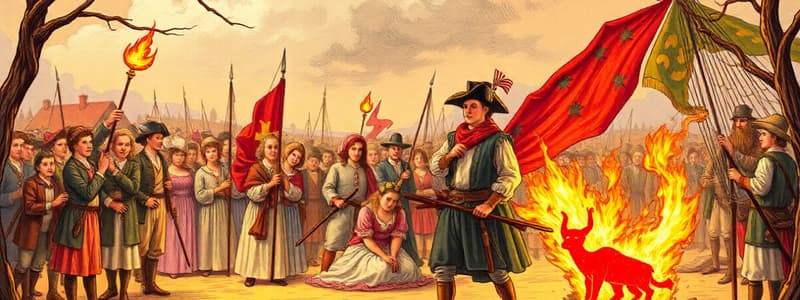Podcast
Questions and Answers
What were the primary causes of Bacon's Rebellion?
What were the primary causes of Bacon's Rebellion?
- Support for the British monarchy
- Economic discontent among wealthy planters
- Frustration over Native American policies and land expansion (correct)
- A demand for a stronger central government
Which region of British North America had the most rigorous slave codes?
Which region of British North America had the most rigorous slave codes?
- New England Colonies
- Southern Colonies (correct)
- Middle Colonies
- Frontier Regions
Who was a notable leader during the Great Awakening known for his passionate sermons?
Who was a notable leader during the Great Awakening known for his passionate sermons?
- George Whitefield (correct)
- John Wesley
- Thomas Hobbes
- Jonathan Edwards
What was a significant outcome of the Seven Years’ War?
What was a significant outcome of the Seven Years’ War?
What triggered Pontiac’s War?
What triggered Pontiac’s War?
What factor significantly contributed to the deterioration of relationships between Native Americans and British colonists during Pontiac's War?
What factor significantly contributed to the deterioration of relationships between Native Americans and British colonists during Pontiac's War?
Which British policy after the French and Indian War restricted Native American access to land and resources?
Which British policy after the French and Indian War restricted Native American access to land and resources?
What long-term effect did Pontiac's War have on future U.S. relations with Native American tribes?
What long-term effect did Pontiac's War have on future U.S. relations with Native American tribes?
What was one significant outcome of Pontiac's War regarding Native American identity?
What was one significant outcome of Pontiac's War regarding Native American identity?
How did the leadership of Pontiac influence the resistance against British encroachment?
How did the leadership of Pontiac influence the resistance against British encroachment?
Flashcards are hidden until you start studying
Study Notes
Bacon's Rebellion
- Nathaniel Bacon was a Virginia planter and the leader of Bacon's Rebellion in 1676.
- Rebellion arose from frustrations over Governor William Berkeley's policies, including favoritism towards wealthy planters.
- Settlers were angry about lack of protection from Native American raids on the frontier.
- Bacon organized armed resistance, demanding action against Native tribes, which led to a series of confrontations.
- The rebellion escalated as Bacon's forces attacked both Native Americans and Berkeley's loyalists.
- Ultimately, Bacon died of dysentery, leading to the collapse of the rebellion and harsh reprisals against dissenters.
Characteristics of Slavery in British North America
- Slavery varied significantly by region:
- In the Chesapeake, slave labor was primarily in tobacco planting, with a focus on larger plantations.
- The Lowcountry (South Carolina and Georgia) relied heavily on rice and indigo, creating a unique plantation economy with a high percentage of enslaved Africans.
- The Northern colonies had smaller-scale slavery, integrating enslaved people into households and artisan shops, with a focus on urban labor.
The Great Awakening
- A religious revival movement in the 18th century aimed at revitalizing spiritual fervor among colonists.
- Key figures included Jonathan Edwards and George Whitefield, who preached emotional and personal approaches to faith.
- Significant locations: many sermons were held in open fields, fostering communal gatherings outside of traditional church settings.
- Impact: increased religious diversity, challenged established churches, and laid groundwork for social egalitarianism.
Causes and Effects of the Seven Years' War
- Causes included territorial disputes between British and French colonies, particularly over the Ohio River Valley.
- Economic competition and British expansionism threatened French interests in North America.
- Effects included the Treaty of Paris (1763), which ceded large territories to Britain and deepened colonial dissatisfaction with British rule.
- War increased Britain’s debt, leading to new taxes on American colonies, which contributed to rising tensions.
Pontiac's War
- Caused by Native American leaders, including Pontiac of the Ottawa tribe, resisting British post-war expansion into their territories.
- Native tribes formed a coalition to challenge British control, leading to several attacks on frontier forts.
- The war highlighted Native American discontent with British policies and lack of respect for treaties.
- Effects included the Proclamation of 1763, which restricted colonial expansion westward, further straining relations between Britain and colonists.
Causes Of Pontiac's War
- Colonial expansion of British settlers after the French and Indian War led to encroachments on Native American lands.
- British post-war policies, such as the Proclamation of 1763, limited Native American access to land and resources, fostering resentment.
- The loss of French support weakened Native American defenses and contributed to their frustration with increasing British dominance.
- Cultural differences between Native American tribes and British settlers heightened tensions, stemming from contrasting worldviews and lifestyles.
- Chief Pontiac of the Ottawa tribe became a key figure, uniting various tribes to resist British encroachment and assert their rights.
Long-term Impacts On US History
- Resulted in shifts in British colonial policy, leading to a more cautious approach towards Native American affairs.
- Fostered a sense of Native American identity, unity among tribes, and set the stage for future resistance movements.
- Established a precedent for subsequent conflicts between the U.S. government and Native American tribes, influencing treaties and territorial negotiations.
- The British response included an increased military presence in North America to maintain control and protect settlers, impacting colonial relations.
Effects On Native American Relations
- Trust between Native Americans and British colonists deteriorated due to violent conflicts and numerous broken treaties.
- The war encouraged the formation of alliances among various tribes as a collective resistance against colonial expansion.
- Native Americans began adopting more organized strategies for resistance, influencing future engagements with U.S. forces.
- Prompted reevaluation of tribal political structures and alliances, impacting Native American governance and diplomacy in the long term.
Studying That Suits You
Use AI to generate personalized quizzes and flashcards to suit your learning preferences.



